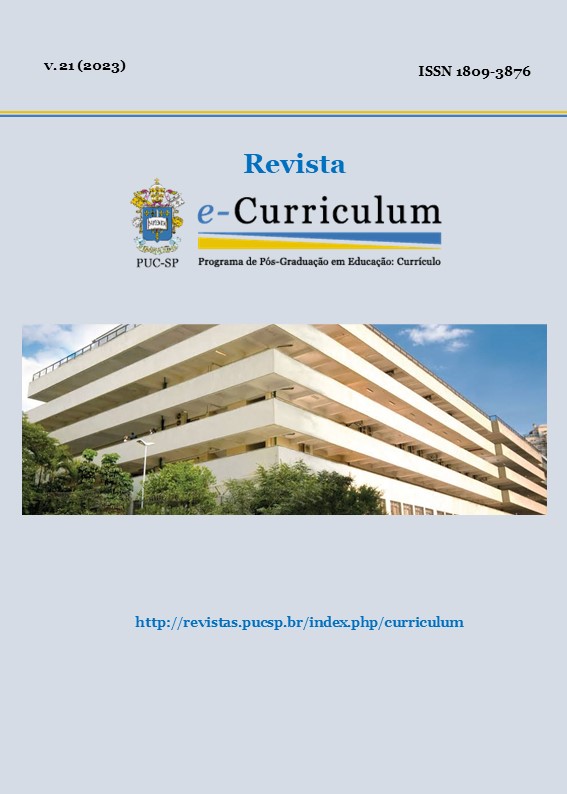O ensino da metodologia da pesquisa científica – entrelaçando modalidades, metodologias e cenários de ensino-aprendizagem
DOI:
https://doi.org/10.23925/1809-3876.2023v21e61629Palavras-chave:
metodologia científica, formação do pesquisador, ensino remoto emergencial, metodologias ativas, mestrado profissionalResumo
Este artigo tem por objetivos refletir sobre a experiência da disciplina Metodologia da Pesquisa Científica no Ensino Remoto Emergencial (ERE) e o seu retorno à modalidade presencial, bem como sistematizar as lições apreendidas. Apresenta uma narrativa reflexiva, destacando os períodos pré/trans e quase pós-pandemia. Os fundamentos da disciplina estão alicerçados nos princípios da pedagogia crítica com ênfase no diálogo, na produção colaborativa, na autonomia, na criticidade, na curiosidade, na criatividade, no fortalecimento da relação prática-teoria e na relação instituição formadora e sociedade. A reflexão revelou um futuro promissor com o aprimoramento das TDICs, sua incorporação às práticas pedagógicas e a consolidação dos pressupostos adotados, embora permaneçam desafios como a equidade de acesso às tecnologias.
Referências
Alducin-Ochoa, Juan Manuel; Vázquez-Martínez, Ana Isabel. Hybrid Learning: An Effective Resource in University Education? International Education Studies, v. 9, n. 8, p. 1, jul. 2016. Disponível em: https://eric.ed.gov/?id=EJ1110170. Acesso em: 22 mar. 2023.
Andrade, Maureen Snow. Teaching Online: A Theory-based Approach to Student Succes. Journal of Education and Training Studies. v. 3, n. 5, p. 1-9, may, 2015. Disponível em: https://www.researchgate.net/publication/281247947_Teaching_Online_A_Theory-based_Approach_to_Student_Success. Acesso em: 22 mar. 2023.
Bail, Frederick T., Zhang, Shuqiang, Tachiyama Gary T. Effects of a Self-Regulated Learning Course on the Academic Performance and Graduation Rate of College Students in an Academic Support Program. Journal of college Reading and Learning. v.39, n. 1, p. 54-73, jul. 2008. Disponível em: https://eric.ed.gov/?id=EJ816620. Acesso em: 22 mar. 2023.
Batista, Nildo Alves; Jurdi, Andréa Perosa Saigh; Carnut, Leonardo; Uchôa-Figueiredo, Lúcia da Rocha; Poletto, Patricia Rios; Rossit, Rosana Aparecida Salvador; Batista, Sylvia Helena Souza da Silva. Programa de Mestrado Profissional Ensino em Ciências da Saúde: aprendizagens em perspectivas. In: Seiffert, Otilia Maria Lúcia Barbosa, Rossit, Rosana Aparecida Salvador (orgs.) Saúde-Educação e os 25 anos do Cedess: sentidos e significados das caminhadas dialógicas. São Paulo: Universidade Federal de São Paulo /Centro de Desenvolvimento do Ensino Superior em Saúde, 2021. p. 47-74.
Freire, Paulo. Pedagogia da autonomia: saberes necessários à prática educativa. 51. ed. São Paulo: Paz e Terra, 2015.
Freitas, Adenisia Alves de. O Homem e a História na Filosofia da Práxis de Adolfo Sánchez Vázquez. Fato & Versões Revista de História, Mato Grosso do Sul, v. 5, n. 10, 2013. p. 1-10, jul. 2013. Disponível em: https://periodicos.ufms.br/index.php/fatver/article/view/1296/822. Acesso em: 22 nov. 2023.
Gerab, Irani Ferreira da Silva; Sonzogno, Maria Cecilia; Seiffert, Otilia Maria Lúcia Barbosa; Conde, Simone Regina Souza da Silva (orgs.) Metodologia da Pesquisa. In: Coletânea Mestrado Profissional Ensino em Ciências da Saúde – Região Norte / Centro de Desenvolvimento do Ensino Superior em Saúde – CEDESS. Universidade Federal de São Paulo. 2012. Disponível em: http://www2.unifesp.br/centros/cedess/mestrado/cadernos_mpnorte/caderno_mpn03.pdf. Acesso em: 03 abr. 2023.
Goedert, Lidiane; Ardt, Klalter Bez Fontana. Mediação pedagógica e educação mediada por tecnologias digitais em tempos de pandemia. Criar Educação, Criciúma, v. 9, n. 2, 2020 p. 104-121, 2020. Disponível em: https://periodicos.unesc.net/ojs/index.php/criaredu/article/view/6051/5402. Acesso em: 22 nov. 2023.
Lopes, Alice. Casimiro.; Borges, Veronica. Formação Docente, um projeto impossível. Cadernos de Pesquisa, São Paulo, v. 45, n. 157, p. 486-507, jul/set., 2015. Disponível em: https://www.scielo.br/j/cp/a/3fndzqkhx7vvrGDNc3vWMVq/?lang=pt. Acesso em: 01 abr. 2023.
Moreira, Marco Antonio. ¿Al afinal, qué es aprendizaje siginificativo? Qurriculum: Revista de teoría, investigación y práctica educativa, n.5, p. 29-56, mar. 2012. Disponível em: https://lume.ufrgs.br/bitstream/handle/10183/96956/000900432.pdf?sequence=1&isAllowed=y. Acesso em: 24 abr. 2023.
Paiva, Vera Lúcia Meneses de Oliveira. A pesquisa narrativa: uma introdução. Revista Brasileira de Linguística Aplicada, Belo Horizonte, v. 8, n. 2, p. 261-266, 2008. Disponível em: https://doi.org/10.1590/S1984-63982008000200001. Acesso em: 28 ago. 2023.
Rocha, Zeferino. A experiência psicanalítica: seus desafios e vicissitudes, hoje e amanhã. Ágora: Estudos em Teoria Psicanalítica, Rio de janeiro, v. 11, n. 1, p. 101-116, ago. 2008. Disponível em: https://www.scielo.br/j/agora/a/xg3NY7rDRG3jsSWZLTFCYLz/?lang=pt#. Acesso em: 06 abr. 2023.
Soffner, Renato Kraide. A promessa de Papert: tecnologias digitais, inovação e práticas educativas. Revista de Ciências da Educação, Americana, n. 48, p. 1-20, 2021. Disponível em: https://scholar.archive.org/work/pc6csp7655aatmt3gj4mycvf2q/access/wayback/http://revista.unisal.br/ojs/index.php/educacao/article/download/939/554. Acesso em: 04 abr. 2023.
Torenbeek, Marjolein; Jansen, Ellen; Suhre, Cor. Predicting undergraduates’ academic achievement: the role of the curriculum, time investment and self-regulated learning. Studies in Higher Education, v. 38, n. 9, p. 1393–1406, 2013. Disponível em: https://www.researchgate.net/publication/225090166Predicting_undergraduates'_academic_achievement_The_role_of_the_curriculum_time_investment_and_self-regulated_learning. Acesso em: 22 mar. 2023.
Vázquez, Adolfo S. Filosofia da Praxis. 2. ed. Rio de Janeiro: Paz e Terra, 1977.
Downloads
Publicado
Como Citar
Edição
Seção
Licença
Copyright (c) 2023 Revista e-Curriculum

Este trabalho está licenciado sob uma licença Creative Commons Attribution 4.0 International License. Os autores concedem à revista todos os direitos autorais referentes aos trabalhos publicados. Os conceitos emitidos em artigos assinados são de absoluta e exclusiva responsabilidade de seus autores.
Todo o conteúdo da Revista e-Curriculum é aberto para acesso público, propiciando maior visibilidade, alcance e disseminação dos trabalhos publicados.











